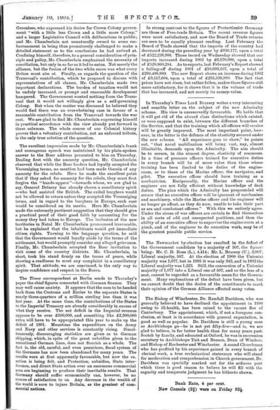In Thursday's Times Lord Brassey writes a very interesting and
sensible letter on the subject of the new Admiralty scheme. His view is unreservedly favourable. He holds that it will get rid of the absurd class distinctions which existed, or were supposed to exist, between the different branches of the Service, and that the training which all officers will receive will be greatly improved. The most important point, how- ever, in the letter is the defence of the elasticity secured under the new scheme. "All experience goes to show," be points out, "that naval mobilisation will bring vast, nay, almost illimitable, demands upon the Admiralty. The aim should be to secure, in ithe utmost degree, elasticity of resources. In a time of pressure officers trained for executive duties in every branch will be of more value than those whose training has been limited to the duties of the engine- room, or to those of the Marine officer, the navigator, and pilot. The executive officer should have training as a mechanician. Reciprocally, the Marine officer and the engineer are not fully efficient without knowledge of deck duties. The plan which the Admiralty has propounded will secure that no executive officer will be ignorant of mechanism and machinery, while the Marine officer and the engineer will no longer go afloat, as they do now, unable to take their part as sea and combatant officers." With this we entirely agree. Under the stress of war officers are certain to find themselves in all sorts of odd and unexpected positions, and then the ability of an executive officer to supervise the engine-room at a pinch, and of the engineer to do executive work, may be of the greatest possible public service.






































 Previous page
Previous page